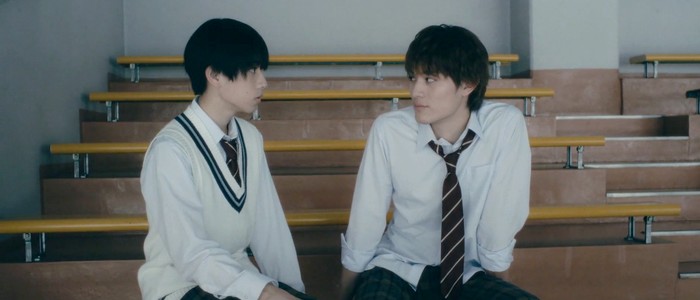
Our Youth is a Japanese BL series about the romance between a top student and his delinquent classmate. The main character is an overachieving teenager who gets excellent grades and always follows the rules. He earns constant praise from his teachers and family. The protagonist crosses paths with a troublemaker in his class, whom everyone tells him to avoid. Despite the warnings, he finds himself drawn to the mysterious rebel.
I'm proud to call Our Youth one of my BL favourites. This sophisticated drama is packed with substance and emotional depth. Its artistic brilliance includes stunning visuals, symbolic imagery and a mesmerizing soundtrack. Even the lines are written so beautifully that they read like elegant poetry. The couple develops a compelling romance with many highs and lows. Also, the leads share excellent chemistry and embody their roles.
Our Youth Summary
Title:
未成年~未熟な俺たちは不器用に進行中~
Series Info:
Japan (2024)
Genre:
High school romance
About:
Our Youth is a sad & emotional BL drama.
Plot
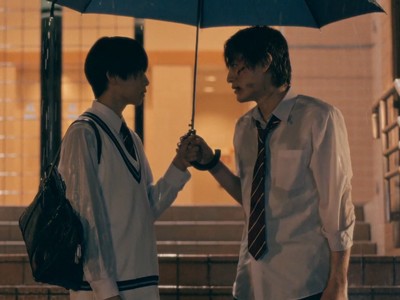
Jin Minase is a first-year high school student known for his good grades and disciplined nature. He always follows the rules, making him a favourite among teachers. His mother, who works overseas, sets high expectations for him and often stresses the importance of academic success. Jin's father is a busy film director and keeps his distance from the family. Since his parents are rarely around, Jin is often left home alone. It's just him and his goldfish.
Jin's mother advises him, "You must choose your friends wisely." She warns that spending time with the wrong crowd could ruin his future. At school, Jin is close to Shiba and Nemoto, two fellow good students who often study with him. However, Nemoto is more interested in girls than in schoolwork, sometimes prioritizing dating over academics. Shiba, less lucky in love, frequently scolds Nemoto for losing focus. Unlike Nemoto, both Shiba and Jin prefer to stay single. They focus on their studies instead of romance.
Jin is in the same class as Haruki Hirukawa, a notorious troublemaker. Haruki skips classes, smokes cigarettes, and spends time with a rough crowd. Jin once saw Haruki strangling a teacher on campus, cementing his reputation as dangerous. Haruki is also friends with Majima, who has started smoking and skipping classes. Shiba and Nemoto speculate that Haruki is a bad influence who corrupted Majima. Shiba warns Jin to stay away from Haruki and not to get involved with him.
Jin sees the world in three categories: perpetrators, victims, and bystanders. This mindset is tested when he walks past Haruki's house. He witnesses Haruki's father violently beating his son. Jin stays true to his role as a bystander, does nothing, and moves on. Later, he finds Haruki injured and lying on a bench at the playground. Feeling a pang of sympathy, Jin offers him a bottle of water. Haruki asks his classmate to feed it to him. Although annoyed, Jin complies, creating an intimate moment as he brings the bottle to Haruki's lips.
After the incident at the park, Haruki starts acting friendlier toward Jin. He tries to initiate conversations, but Jin remains wary of being seen with him. He tells Haruki not to talk to him at school. Even so, Haruki finds ways to interact with Jin on their way home. One day, Jin mentions he's looking for a rare movie, The Sound of Music. To his surprise, Haruki has it in his DVD collection. Haruki invites Jin to watch it in his room. Although reluctant, Jin agrees. Despite all the warnings to stay away, Jin slowly begins to form a friendship with Haruki.
Our Youth Trailer
Our Youth Cast
Characters
Jin
Junsei Motojima (本島純政)
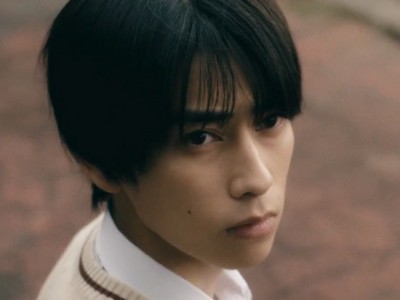
Jin Minase is a first-year high school student praised for his excellent grades and disciplined nature. He is a favourite among teachers and follows the rules diligently, earning him a reputation as a model student. His mother, who works overseas, pressures him to focus on academics. Jin's father, a busy film director, is distant and rarely around. Often left alone at home, Jin spends his quiet time caring for his goldfish and studying.
Junsei Motojima
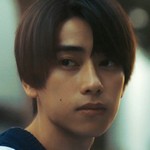
Junsei Motojima (本島純政) is a Japanese actor. He is born on January 5, 2005. His first BL leading role is the 2024 drama, Our Youth. He also has a supporting role in the 2023 series, Tokyo in April is…
Haruki
Kenshin Kamimura (上村謙信)
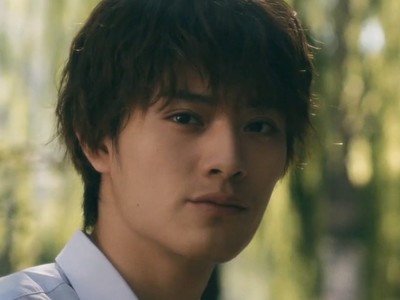
Haruki Hirukawa is a notorious troublemaker in Jin's class. He's infamous for skipping school, smoking, and hanging out with a rough crowd. His rebellious nature has given him a dangerous reputation. He's often blamed for being a bad influence on his friend, Majima. Beneath his tough exterior, Haruki hides a troubled home life, enduring violence from his drunk father. After witnessing the abuse, Jin sympathizes with Haruki and grows closer to him.
Kenshin Kamimura
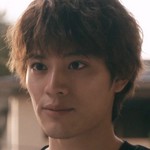
Kenshin Kamimura (上村謙信) is a Japanese actor. He is born on July 8, 1999. His first BL leading role is the 2024 drama, Our Youth. He also has a small supporting role in the 2024 drama, Ossan's Love Returns.
Supporting Cast
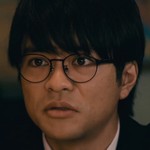
Shiba
Yuki Imai (今井悠貴)

Nemoto
Itsuki Miyaji (宮地樹)

Haruki's dad
Shuji Okui (奧居俊二)

Haruki's mom
Ari Nishihara (西原亜希)

Jin's mom
Takako Kato (加藤貴子)

Jin's dad
Takashi Yûki (結城貴史)

Majima
Kazuki Horike (堀家一希)

Shiori

Kooji

Teacher

Hinata

Jin's fish
Cast Highlights
Junsei Motojima
Jin's actor has a supporting role in the 2023 Japanese BL drama, Tokyo in April is…
Kenshin Kamimura
Haruki's actor has a small supporting role in the 2024 BL comedy series, Ossan's Love Returns.
Kazuki Horike
Majima's actor has a supporting role in the 2024 drama, Although I Love You and You.
Our Youth Review
Review
Drama Review Score: 9.7
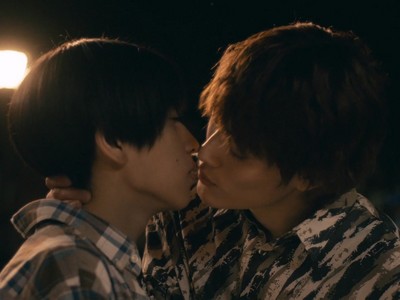
Our Youth is an exquisite work of art. The opening scene sets the tone with a majestic ocean view and a mesmerizing soundtrack, accompanied by the lead's poignant monologue. I don't know what's happening yet, but the atmosphere already sweeps me away. The rest of the drama carries the same elegance, substance, and emotional depth. Every episode, I'm drawn deeper into this hauntingly beautiful love story. If you've thought the BL genre only consisted of romantic fluff, Our Youth will change your mind.
This sophisticated drama features complex characters with rich backstories. Jin and Haruki come from different worlds. A top student and his delinquent classmate may seem incompatible, yet the series creates a compelling journey that brings them together. Despite the high school setting, the narrative themes are remarkably mature. In fact, the tragedy of the story is how these teenagers must grow up too soon. They're forced to deal with adult-like problems since their guardians have failed them. As Haruki's trauma worsens and Jin struggles to help him, their painful experiences will break our hearts.
Our Youth finds a delicate balance between melancholy and melodrama. The series shows restraint by not overwhelming you with a flood of grief. Instead, it builds the emotions gradually in waves. Smaller moments of sadness lead to larger ones, culminating in a powerful climax. The romance lightens the tone, using the sweetness of falling in love to counter the angst. One moment, you're giddy as Jin and Haruki flirt. The next, your heart tightens as they're left so vulnerable. Our Youth takes you on a journey of highs and lows, intertwining joy with sorrow.
Jin and Haruki have a sensational romance. Part of their appeal is how opposites attract, so I'm excited to see the school rebel seduce the ace student. Their unexpected similarities emerge as they grow closer, making me want to ship them even more. The series highlights both their physical and emotional bond. The couple is enjoyable whether they flirt nervously or kiss intimately. The leads share vivid chemistry, brought to life by their stellar performances. Junsei Motojima gives Jin quiet dignity, while Kenshin Kamimura portrays Haruki with strength and vulnerability.
Our Youth shines in its creative vision. The music is perfectly timed, heightening emotions at just the right moments. My favourite is a celestial-sounding piece that feels like an angel's voice singing. Yet, the series also knows when silence is more powerful and uses it to create poignant moments. Aesthetically, everything looks stunning. Many scenes are filled with symbolism, including subtly coded religious imagery. Each visual detail adds new depths to the story. The artistry even extends to its language. Some lines are written so elegantly that they read like poetry.
Our Youth impresses me with its excellence episode after episode, but the pacing drops in the last stretch. When the plot transitions into the adulthood phase, it loses the engaging momentum. Some scenes seem like filler, just enough to chip away at the story's perfection. The series redeems itself with an impressive epilogue special, which I consider essential viewing. It finishes the story strongly, restoring my enthusiasm for this couple's epic journey. As I reflect on the beauty and brilliance of this masterful drama, I'm proud to call Our Youth one of my BL favourites.
Summary
Powerful story
Our Youth is a sophisticated love story with mature themes, complex characters, and powerful emotions. It remains compelling by finding the right balance between melancholy and melodrama.
Emotional romance
Jin and Haruki's romance captures the excitement of opposites attract. The couple takes us on an emotional relationship journey, from tender exchanges to passionate kisses.
Delicate acting
The leads share excellent chemistry. Junsei Motojima gives Jin a quiet grace, while Kenshin Kamimura portrays Haruki with a delicate balance of strength and raw emotion.
Happy ending
Our Youth has a happy ending as the couple finds their hard-earned happiness in adulthood. The epilogue special ties together the characters' journey beautifully and meaningfully.
Exquisite artistry
The series dazzles with its creative vision, delivering gorgeous visuals, thoughtful symbolism, and a poignant soundtrack. Its artistry even extends to the words, and some lines read like elegant poetry.
97%
Our Youth is a masterful BL series with thoughtful storytelling, a mesmerizing romance, and artistic brilliance. The couple goes on a poignant journey that unleashes powerful emotions.
Our Youth Episodes
Episode Guide
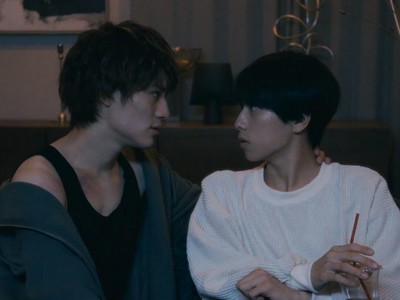
- Start Date November 7, 2024
- End Date January 7, 2025
- Episodes 10 episodes + special
- Episode Length 24 minutes
Our Youth has a total of 10 episodes. Each episode is around 24 minutes long. There's also an epilogue special continuing the story after the series, and it's highly recommended you watch this special. It is a long BL drama, and you can finish the entire series in under 5 hours. Our Youth started on November 7, 2024 and finished on January 7, 2025.
Our Youth is adapted from a Korean webtoon. The original work is made by Hi Noon (히눈).
Episode 1
Episode 1 Review
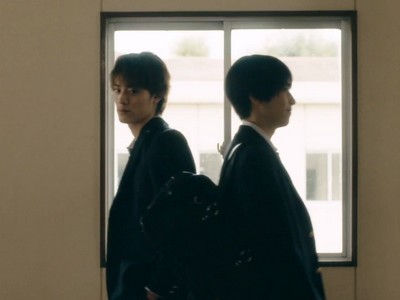
In the first 30 seconds of the series, we're already introduced to a meaningful piece of symbolism. Jin walks in a straight line along the seashore. He briefly detours toward the water, hesitates, and returns to his original path. This moment reflects Jin's nature. He's a disciplined student who follows a predefined path in life. He's never meant to stray away from it. His caution stops him from exploring new opportunities. Jin's life is straight and narrow, mirroring the rigidity of his character. That's how the story introduces our protagonist.
I like how the other students eat lunch on the school rooftop alongside Jin and his friends. In many Japanese BL dramas, the protagonist is the only one up there. Having other people populate the area is realistic. Also, it's amusing to see them bring chairs to sit on, a quirky detail most series wouldn't include. My theory: the production wanted to film on the roof for its pretty visuals, but going there seems too rebellious for Jin's character. Including other students around him makes his presence feel more ordinary.
Bystanders
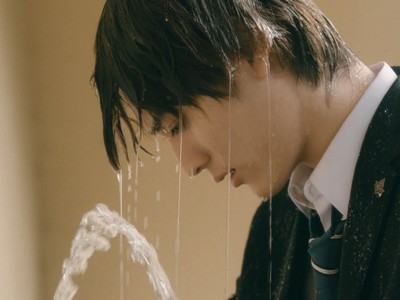
There are three types of people in this world: those who use the faucet to wash their hands, those who drink from it, and those who break it and spray themselves with water. That's how the story introduces Haruki, the school rebel known for being unconventional. While Haruki's actions with the tap water may seem random, a deeper meaning is revealed later in the story. Intriguing and seemingly inexplicable, Haruki's character reminds us not to judge based on first impressions. There's always more beneath the surface.
The real quote describes the dynamics of violence, dividing the world into perpetrators, victims, and bystanders. The framework fits this drama: Haruki is the victim, his abusive father is the perpetrator, and everyone else are bystanders for not intervening. Jin has always lived as a bystander. He's taught to mind his business and not get involved. However, he meets Haruki and witnesses his suffering. Despite the warnings, Jin's instinct is to support his classmate. This story is fascinating because it explores what happens when a bystander decides to help a victim.
Lifeline
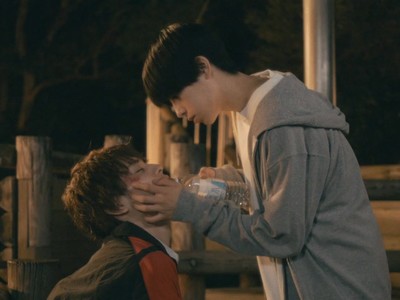
Jin feeding water to Haruki is a memorable moment since it foreshadows their relationship dynamic. At first, Jin hesitates to get involved. He offers the bottle from a distance, reflecting his stance as a bystander. As Jin moves closer and spills the water, his clumsy actions symbolize his awkward attempts to help. At last, Jin carefully places the bottle on Haruki's lips. His intimate gesture is full of tenderness. This scene mirrors how Jin's feelings evolve over the series, from reluctance to clumsiness to affection.
In the final scene, the severity of Haruki's bruises is revealed. Oh, they look painful! As Jin treats his classmate's injuries, he delivers a chilling line: "This can't happen again. Don't talk to me at school." Jin feels conflicted. Despite sympathizing with Haruki, he hesitates getting too involved with the school troublemaker. Jin wants to retreat to his role as a bystander and return to the predefined path he has always followed. The closing scene mirrors how the episode began, emphasizing Jin's caution to stray away from his carefully structured life.
Episode 2
Episode 2 Review
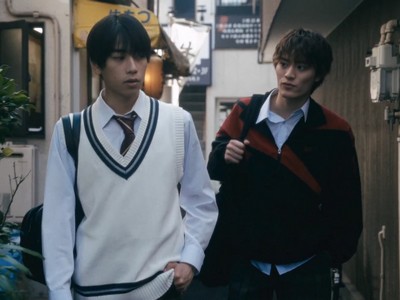
This episode explains why Jin hesitates to get close to Haruki. He's surrounded by disapproving friends and family, whose opinions weigh on him. Shiba is the judgmental friend, warning Jin to avoid Haruki and condemning him as a bad influence. While Nemoto may be more lighthearted, he still loves to gossip, especially about Majima's smoking habits. Did you notice in the restaurant scene that Nemoto holds the straw near his mouth, almost like a cigarette? The story hints that he later becomes a smoker after giving in to his curiosity.
Aside from his friends, Jin has a judgmental mother who instills twisted views in him. She condemns her husband and anyone pursuing artistic careers. "Don't waste your life like him." These are cruel words, considering creative professionals make an honest living, just like her. Later, she warns Jin that bad friends can ruin his life. Jin jokingly says, "It's better to avoid friendships altogether." She actually praises him for this idea. Her toxic parenting style shapes Jin's rigid worldview. He's reluctant to engage with those outside his narrow definition of "good company".
Refuge
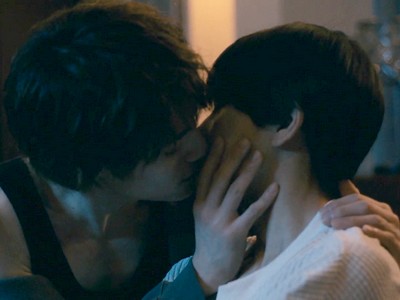
Haruki grows fond of Jin and invites him to watch movies at his house. The visit offers a glimpse into Haruki's life. We see his dad's messy drinking area, contrasted by loving photos of his mother, hinting at his complicated family background. When they enter Haruki's bedroom, it's nothing like you'd expect based on his delinquent reputation. Instead of booze, drugs, or weapons, it's a typical teenager's room filled with movies, art supplies, and even a jar of lollipops. Despite Haruki's tough exterior, his private space reveals a softer side of him.
Jin lets Haruki stay at his place for the night, giving him a safe refuge from his abusive home. Sitting together, Jin opens up about his distant relationship with his parents. Haruki realizes they have a lot in common. In that vulnerable moment, he suggests they kiss. It may seem sudden, but his response stems from complex emotions. One, he hopes to comfort Jin and connect with him due to their shared struggles. Two, he's grateful for Jin's kindness and wants to show appreciation. And three, he's simply attracted to Jin. Haruki acts on his growing feelings for the guy he likes.
Suffering
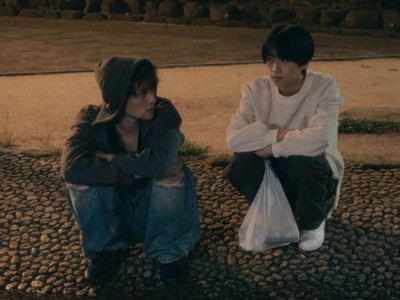
While watching the movie, Haruki shares a profound quote through his film analysis. "Some people can overcome their suffering, while others get consumed by it." The line is especially poignant as it mirrors Haruki's own life. He faces abuse at home, judgment at school, and condemnation from society. Can he break free from this cycle and create a better future, or is he doomed to a life of despair? The film resonates with Haruki because its themes echo the questions he constantly asks himself.
As outsiders, it's easy to question Haruki's situation. Why doesn't he leave, seek help, or fight back? However, the psychology of an abuse victim is complicated. Haruki believes he's protecting his mother by acting as a punching bag for his father. If he endures the violence, he'll shield her from harm. While this logic may seem irrational, his motivations stem from a misguided sense of responsibility. Beyond the physical abuse, Haruki is hurt by emotional trauma. His father's psychological scars have warped Haruki's mind, conditioning him to accept his circumstances.
Episode 3
Episode 3 Review
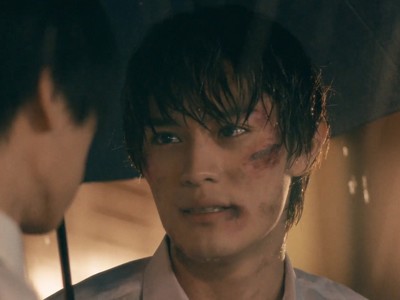
Haruki is unfairly labelled as a troublemaker. Another common misconception is that he must be a playboy. In reality, he's inexperienced. Haruki has admitted to never kissing anyone before Jin. When he mentions his virginity to his pool buddies, they react with ridicule. He's annoyed these so-called friends refuse to understand him. The story explains why Haruki prefers to be around Jin, who accepts him without judgment. Given the choice, Haruki would rather spend time with Jin over Majima or anyone else.
Hehe~ I like the scene where Haruki gets jealous after Jin praises a random TV actor. I'M BETTER LOOKING THAN HIM! He tries to prove his suaveness with another kiss, but it backfires. Jin is alarmed as his thoughts shift from academics to his love life. His test scores begin to slip, whereas Shiba, the perpetually single friend, maintains his spot as a top student. This confirms Jin's suspicion that love is a distraction. His worries intensify when he sees Haruki with a girl, feeding into his playboy reputation. Jin gets the wrong idea and decides to keep his distance.
After being beaten by his father, Haruki waits for Jin in the rain. Shockingly, he admits to provoking the fight on purpose. "If I get hit, will you feel sorry for me again?" This mindset is dangerous since Haruki equates pain with receiving attention. It reveals his distorted self-worth, shaped by abuse, where he feels valued only through pity. Despite Haruki's recklessness, the two reconcile. In Jin's inner monologue, he reflects, "I can't leave you alone while you're swept away without resistance." Haruki appears so vulnerable that Jin's instinct is to protect him.
Episode 4
Episode 4 Review
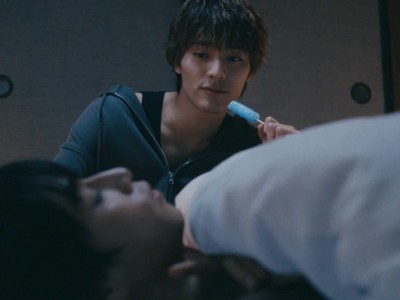
Haruki uses the I'm-not-gay card to deflect from his true feelings. "I won't fall in love with you. We're both men." Despite his promise, Haruki continues to flirt shamelessly at every opportunity. At school, Haruki plays footsie under the desk. At night, Haruki embraces Jin and whispers, "Am I being seduced?" Even when they're apart, Haruki sends hilariously uncharacteristic lovey-dovey text messages. Wow, he's totally smitten!
Jin now sleeps with the window open, an erratic habit he never had before. While this change seems minor, it reflects his uncharacteristic lack of caution. Haruki's influence subtly makes Jin more reckless than usual, and he falls ill as a result. Jin's sickness coincides with his growing feelings for Haruki. This timing is deliberate because the story wants to hint at the correlation. Being in love brings positive changes, but there may also be side effects. This relationship begins to intoxicate Jin, adding chaos to his orderly life.
Popsicle kiss
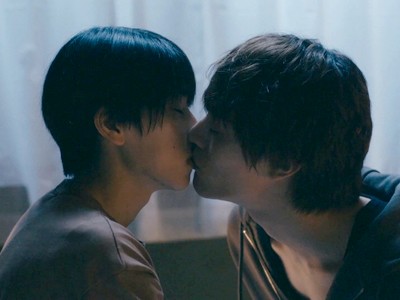
An iconic moment in this episode is when Haruki takes a bite from Jin's popsicle. I know what you're thinking, and yes, it's as suggestive as it sounds~ Jin worries since he's ill and may infect his companion. But Haruki's response is one for the BL history books. "Then infect me," he says before diving in for a kiss. "Infect me, just a little." OMFG I'M SCREAMING. The series dials up the intimacy by removing all background music, making every smack of their lips audible. And as if the kiss wasn't enough, Haruki licks Jin's hand afterward. Just… wow.
While Haruki's interactions are flirty and sensual, Jin balances the romance with sweetness and sensitivity. After their exchange the night before, Jin buys Haruki a gift. Thank you for making out with me! Here's a handkerchief as a token of my appreciation! Aww, how cute is this? The series delivers passion but follows it with tenderness, making the love story feel multifaceted. When the couple holds hands late at night, their emotions feel so genuine. But they were talking so loudly with their classmates nearby. It was risky! I was worried someone would overhear them!
Infection
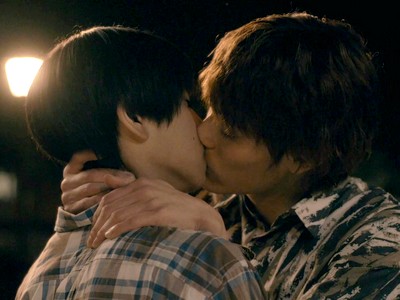
This episode introduces the idea that Haruki has infected Jin. Haruki gives a meaningful line: "They say the cold goes away if you infect other people." On the surface, he refers to Jin's illness, but there's a deeper implication. Haruki carries a psychological burden from his father's abuse. By getting involved, Jin shoulders his companion's pain. Haruki feels better because he no longer faces his problems alone. Yet, Jin is worse off since he feels responsible for looking after Haruki's well-being. Haruki's trauma has passed to Jin, draining him emotionally.
The episode ends with another symbolic exchange. Jin confesses, "The more I'm with you, the weaker I become." Haruki replies, "But when I'm with you, I feel stronger." This dialogue captures the essence of their relationship dynamic. To protect Haruki, Jin must lend him some of his strength. Haruki finds solace in their bond and sees it as a bright spot in his bleak life, yet Jin now bears a mental toll. Their romance is compelling because it reveals an imbalance: one partner gains while the other sacrifices.
Episode 5
Episode 5 Review
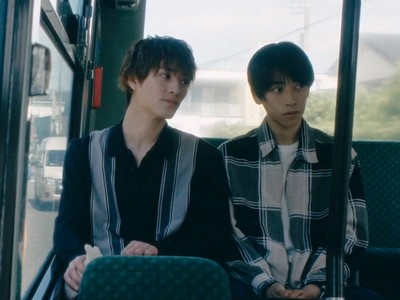
This episode reveals Haruki's perspective on past events and provides valuable insights. He attacked a teacher to defend another student, refusing to be a bystander in the face of injustice. However, resorting to violence unsettles him because his worst fear is becoming like his father. When Haruki uses the school faucet to drench himself in water, it's his way of releasing his rage and regaining self-control. He tries to cool down by cleansing himself from his violent impulses.
Previously, Haruki appeared suave when seducing Jin, but this episode reveals the doubts beneath his bravado. After their first kiss, Haruki thinks, "He must've hated me." His second kiss stemmed from anxiety that Jin might not return his feelings. The most poignant moment comes when he reflects on injuring himself to reconcile with Jin. Driven by desperation, Haruki knew his actions were wrong. On top of his physical wounds, he struggles with the guilt of using self-inflicted harm to seek sympathy. Hearing Haruki's thoughts on each incident makes the story more heartbreaking.
Couple
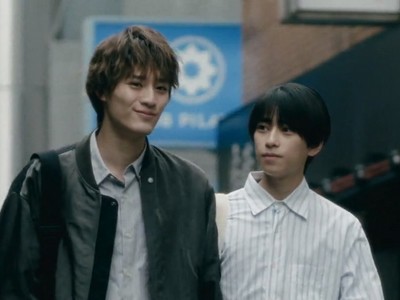
One small detail I enjoy is how Jin and Haruki quietly observe each other. For instance, Jin turns to study Haruki's expression during the movie premiere. Haruki does the same in different scenes. This feels realistic to me. As the couple falls in love, they naturally become curious and want to understand their partner's reactions. What does Haruki think of the film? How does he feel during this moment? These subtle touches make the love story more authentic.
Jin nervously asks, "Are we homosexuals?" I crack up at Haruki's response afterward as he utters a simple OH. I interpret it as shorthand for, "Oh, you haven't realized it yet?" The right time to ask this question was ages ago. The answer should be obvious when you've been making out with this dude every episode since then. 😅 Thankfully, Jin grows more comfortable about his sexuality with each kiss. My favourite moment is when Jin says, "Don't kiss me at school," and Haruki focuses on the "at school" part. I can sense another OH! moment is coming lmao~
Family
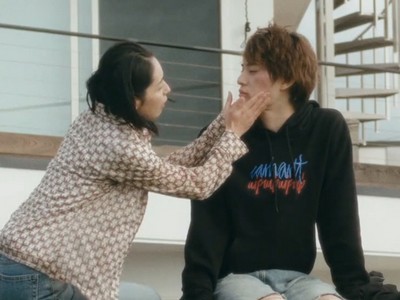
Both leads feel distant from their families. Jin's parents are always busy with work. At least his mom checks in on him, whereas his dad is uninvolved, acting like a bystander in his son's upbringing. Even their rare phone call ends abruptly. Meanwhile, Haruki's abusive father is beyond hope. His mom tries to communicate, but her attention is split with her new family. She should ask about Haruki's struggles or involve him more in her new life. Ultimately, the neglect from all four parents contributes to their children's suffering.
In the closing scene, Haruki plans to visit his mom while his stepdad is away. Jin joins him on this trip. A subtle moment happens when Haruki opens the bus window, and Jin mentions his motion sickness. This mirrors the last episode, where Jin opens his bedroom window and falls ill. The story foreshadows the conflict ahead. Before the visit, Jin starts to feel sick due to his emotional burden. He has the duty of telling Haruki's mom about the abuse. How much should he involve himself in Haruki's family matters, even if it goes against his partner's wishes?
Episode 6
Episode 6 Review
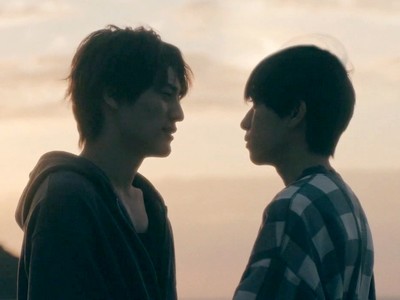
Haruki reveals he won't go to college after graduation. He plans to work and live alone after turning older. While post-secondary education may not suit everyone, Haruki's situation is heartbreaking because he has no choice. To escape his abusive father, Haruki must support himself financially, which means working instead of attending school. Preparing for university is typical for many youths, yet his main focus must be survival. Tragically, this teenager is forced to grow up too soon.
Jin faces his own adultlike dilemmas. He struggles with the decision to report Haruki's abuse. Jin feels he should tell Haruki's mom about the domestic violence, but Haruki warns him to keep his secret. Jin's conscience is torn between the obligation to do the right thing and the fear of making life worse for Haruki. Like many bystanders, Jin is unprepared to handle such a serious situation. This responsibility should have never fallen on him. The adults, like teachers or guardians, missed the warning signs. Their failure forces Jin to carry an emotional burden far too heavy for someone his age.
Haruki's abuse began after his mom left, triggered by her divorce. She's clueless about her son's crisis, and he doesn't want to tell her. Knowing she left her child vulnerable to domestic violence would fill her with guilt, so Haruki wants to spare his mom from this pain. Also, she has a new family now. Haruki hates disrupting her bliss, especially after the struggles of her failed marriage. Haruki's secrecy comes from his fear of being an emotional burden to his loved ones. Due to his low self-worth, he has a pattern of prioritizing their happiness and neglecting his own.
Reborn
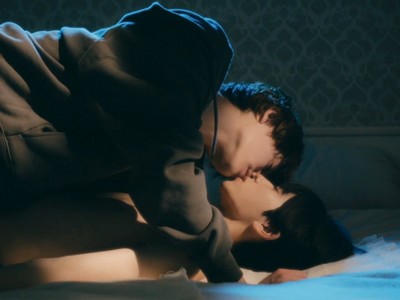
Jin and Haruki's sex scene is stunningly artistic. As they share tender kisses, light and shadows move across their faces. This visual symbolizes their relationship dynamic. Jin's light draws Haruki out of his darkness, while Haruki pulls Jin's purity into the shadows. The majestic soundtrack adds to the ambiance, creating an ethereal atmosphere. That celestial music always plays during an iconic scene and sets the tone for the couple's romantic milestone.
Haruki has convinced himself that his suffering is necessary. He tolerates his father's violence to shield his mother from pain, but this rationale is flawed. In reality, it only hurts Haruki and enables the cycle of abuse to continue. No one should have to endure harm for the sake of protecting someone else. Thankfully, being in a relationship with Jin has changed Haruki's thinking. "I'm done taking hits. I want to be better." Jin's love gives Haruki the strength to break free from his father's hatred. Finally, Haruki understands that he deserves to be safe and happy.
Haruki runs into the sea and splashes water over his head. This scene reminds me of a baptism. There are similar themes of cleansing and rebirth, reflecting Haruki's desire to free himself from his father's abuse. The story uses this symbolic imagery to emphasize his fresh start. Jin follows, stepping into the water and splashing his head. He tells Haruki, "If you're ever lonely, tell me." This meaningful line shows Jin's choice to stop being a bystander. Jin experiences his own rebirth. Unlike before, he wants to get involved in Haruki's life and offer support.
Martyr
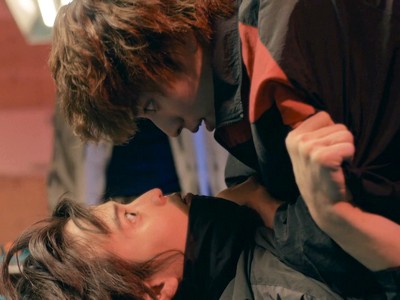
Despite Haruki's willingness to change, his resolve is tested during a clash with Majima. When he refuses to join a robbery heist, their feud escalates into a fight. Taunted by Majima, Haruki lashes out and nearly hurts his friend. This moment terrifies him because his violent impulses mirror his father's behaviour. Unfortunately, the cycle of abuse can transfer from perpetrator to victim. Haruki has been conditioned to the same pattern of aggression he despises in his dad, and breaking free from it isn't easy.
The story suggests that Haruki has been a harmful influence on Majima. He introduced his impressionable friend to smoking and skipping classes. While Haruki has never committed crimes, bad habits are a gateway to serious misconduct. Majima got too involved with a so-called troublemaker, who led him astray. Yet, it's unclear how much blame lies with Haruki. Is he responsible for Majima's actions, or does the accountability fall on Majima himself? The ambiguity remains, but Haruki feels guilty enough to take the school's punishment on Majima's behalf.
Haruki never commits theft, but he gives a false confession and accepts the suspension in Majima's place. While his decision seems puzzling, it aligns with his past behaviour. Haruki often acts as a martyr, taking the blame to protect others. He once let a teacher punish him for Majima's cigarettes. At home, he endured his dad's abuse to shield his mom. Due to his damaged self-worth and misguided loyalty, Haruki's instinct is to sacrifice himself for those around him. As a victim of violence, he has internalized the belief that his role is to bear pain for others.
Episode 7
Episode 7 Review
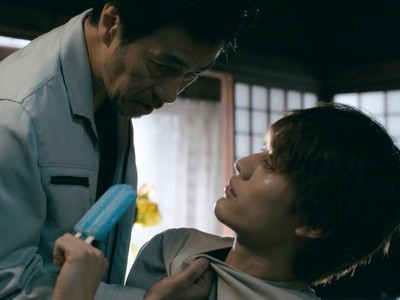
Before his death, Haruki's dad remains relentless in his abuse. He lashes out in drunken rage, fuelled by bitterness over his divorce. In a chilling scene, Haruki flees from his father's violence and locks himself in his room. Behind the door, his father's growls and chaotic noise echo like the roars of a wild beast, almost like something out of Jurassic Park. The story paints a haunting picture of a man who has lost his humanity, reducing him to a monstrous figure Haruki must hide from.
Haruki finds his father's lifeless body in the middle of the night. Even though he's free from his abuser, he feels no relief or happiness. Instead, he's traumatized and internalizes the blame. "It's my fault… it's my fault." Haruki hates himself for wishing his father dead, and now that it has happened, the guilt is unbearable. Of course, Haruki has nothing to do with his parent's self-inflicted death, but he doesn't see it this way. His dad left behind such deep psychological scars that Haruki's mind has been twisted. Even without his abuser, he continues to hurt himself with destructive thoughts.
Salvation
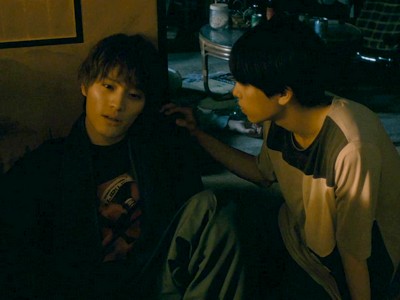
Haruki is haunted by his father's fate, dying as a violent, bitter, and pathetic drunk. Haruki sees shades of himself in his dad and fears he might end up the same way. As these dark thoughts circle his mind, Jin comforts him. In a memorable moment, Haruki rests his head on Jin's hand while soft, celestial music plays in the background. The scene reminds me of prayer, as if Haruki is begging for salvation. He pleads for inner peace and hopes not to follow his father's tragic path. God save Haruki Hirakuwa's soul.
The uncertainty of the future weighs on Haruki. What will happen to him after his father's death? Jin tries to offer reassurances, but Haruki pushes him away. He urges Jin to go home, focus on his studies, and return to a normal life. Beyond his fear for his own fate, Haruki worries about being an emotional burden. If he's doomed to suffer, he doesn't wish to drag Jin down with him. Jin wants to stay and support him, but he feels powerless to help. "Please go, I need you to," Haruki pleads. With tears in his eyes, Jin reluctantly leaves. The only thing he can do is avoid adding more psychological strain to Haruki.
Powerless
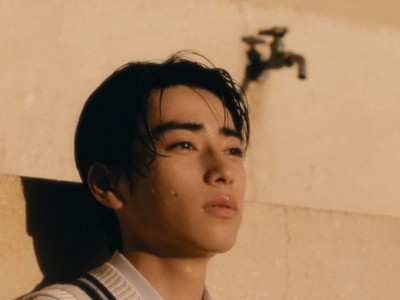
Jin feels powerless. Earlier, he fails to convince the teacher not to suspend Haruki. His friends reinforce the stigma, as if it's shameful to show support. Nemoto says, "If you don't intervene, you won't get in trouble." Jin tries to hold onto his promise to help Haruki and not be a bystander, but it feels impossible. He goes to the faucet and splashes water over himself, echoing a past scene. The water symbolizes Jin & Haruki's desire to change. The faucet, which restricts the flow, represents how society stops them from changing or helping others.
In the closing scene, Jin delivers a poignant monologue. "The waves rise and fall, carrying you further away from me. Before the sea, humans are powerless." The quote describes his feelings of helplessness. No matter how much Jin tries, he can't change Haruki's situation, ease his pain, or alter other people's perception of him. "All I can do is pray." Jin turns to prayer because he can't help Haruki in any other way. Despite his best intentions, he's forced to be a bystander. Faith becomes Jin's last resort to hope that life gets better for Haruki.
Episode 8
Episode 8 Review
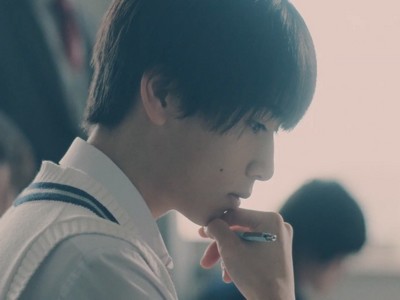
After his father's death, Haruki moves away for a fresh start. He can't stay in a home filled with trauma or a school where others judge him by his reputation. To reinvent himself, Haruki needs a different environment. Living with his mom seems ideal, but there's an unstated assumption that his stepdad won't accommodate him. Still, I support Haruki's decision to go elsewhere, even if it means breaking up with Jin. He deserves to have a new life without any past baggage.
Jin and Haruki have an awkward farewell. "Thank you for being my friend." Um, excuse me!? Did Jin just get friend-zoned? Instead of long-distance dating, Haruki ends their relationship because he fears ruining Jin's future. The chaos in Haruki's life has caused Jin to lose focus on school. By cutting ties, Haruki hopes to stop being a liability. Meanwhile, Jin also worries about holding back his partner. Haruki has a rare chance to rebuild his life, so Jin doesn't want to stand in the way by asking him to stay. Both say goodbye, sacrificing love to ensure each other's growth.
During an emotional scene, Jin reads Haruki's letter. Filled with long passages of gratitude, Haruki expresses how Jin's positive influence has inspired him to change. "I want to become a person worthy of you." As much as his self-improvement seems admirable, the words are bittersweet. There's an implication that Haruki believes he isn't good enough for Jin. "You're better off without me." Haruki's letter is tragic because he sees himself as flawed. Even when he's in a happy relationship with a decent man, Haruki thinks he doesn't deserve it due to his low self-worth.
Episode 9
Episode 9 Review
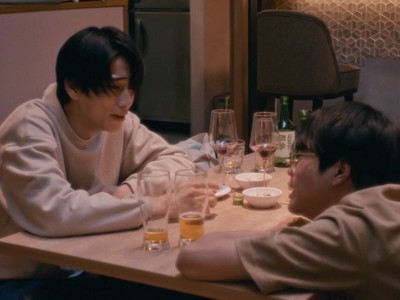
This episode feels like filler, right? After a five-year time skip, viewers have unanswered questions about Jin & Haruki's lives. There's a better use of time than scenes of Jin sleeping on a bench. Either reunite the leads sooner or show more insightful moments about their situations. That said, I still enjoyed the casual interactions Jin and Haruki have with their friends. These scenes offer subtle clues about their growth by showcasing their hobbies or habits. It's fascinating to see how they've matured from teenagers into adults.
After this time skip, the characters have lost their teenage innocence. Nemoto, who once judged his smoking classmates, is now a smoker himself. Shiba used to be perpetually single, but now he's pining after a girl. Jin has picked up both heavy smoking and excessive drinking, becoming so drunk that he can't function in public. I didn't predict Jin would be the one to develop alcoholic tendencies. His adult habits almost seem inherited from Haruki, like symptoms that manifested after their time together. Haruki's influence is so strong that he changes Jin fundamentally as a person.
Reunion
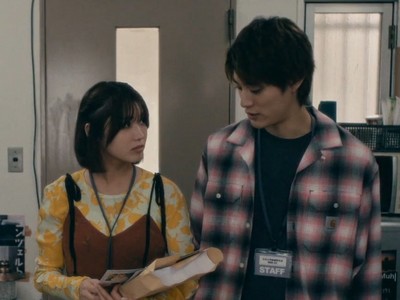
Shiori jokes that Haruki has middle-school syndrome. Okay, this label is hilariously accurate lmao. After she calls him that, I think about his past antics and see the syndrome everywhere. He writes letters no one will read, watches artsy indie movies, drenches his head with water, and says lines like "infect me just a little". Haruki constantly does things that seem profound but come across as juvenile, like a middle school student trying to be an adult. However, this trait actually makes his character endearing. I like him more because of it, hehe~
The reunion was so awkward! Why did Haruki walk past Jin without saying anything!? OMG COME BACK. Later, Haruki explained he was in shock. He didn't expect to encounter his ex on the school campus. Even so, my heart sank as I watched their distant interactions. This isn't how I envisioned their romantic reunion five years later. I pictured them running into each other's arms, cherry blossoms drifting in a gentle breeze, and the sunset glowing in the background. Instead, Haruki was like "lol k bye~" because he had to hurry to class. WHAT? No, you were supposed to reconcile with your ex and say I love you! 😭
Episode 10
Episode 10 Review
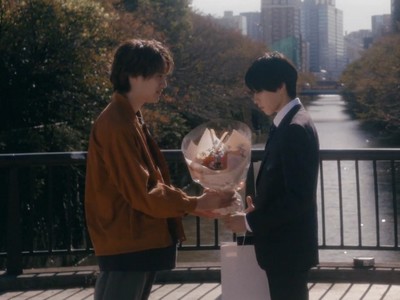
What a powerful way to start the finale! I didn't expect Jin to cry after waking up and seeing Haruki's face. His emotional reaction shows just how much the reunion means to him. Later, Haruki feeds water to Jin. The intimate moment mirrors their first exchange in the premiere. Except this time, it's Haruki nurturing Jin. The story highlights Haruki's growth, transforming from the helpless victim in Episode 1 to the supportive caretaker in Episode 10. He's clearly in a better place now.
Haruki has changed over the past five years. The fresh start did wonders for him. Away from his abusive home and the social stigma, he healed from his scars. He built a strong work ethic, so no more slacking off or skipping class. Instead, he focused on his studies and graduated high school. He must've picked up his discipline from Jin. Also, Haruki has found ambition. He used to have no dreams beyond escaping his father, but now he's in film school and plans to become a director. With the freedom to follow his passions, Haruki has grown into a self-assured adult.
Changes
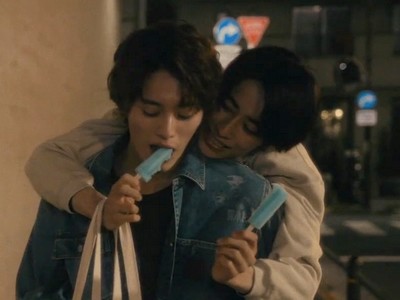
Like Haruki, Jin has changed a lot over the past five years, both in good and bad ways. He picked up habits like smoking and excessive drinking. However, he also inherited Haruki's playful side. As a teenager, Jin was serious and mature, rarely joking around. Now, he's eating popsicles, asking for piggyback rides, and being more carefree. Haruki's mischief has rubbed off on him, teaching Jin not to take himself so seriously. Being with Haruki brings a lightheartedness to Jin's life.
Another quality Haruki inspired in Jin is creativity. After Haruki's departure, Jin channelled his sadness into writing. He wrote long, eloquent letters about his feelings. They were never sent, like private diary entries. We hear some passages throughout the series. Jin's mom once discouraged him from artistic pursuits, but he has learned to tap into his creative side anyway. Writing is a hobby that helps Jin express himself better and become more open with his emotions. When Jin sees Haruki again, he already knows all the right words to tell him how he feels.
Journey
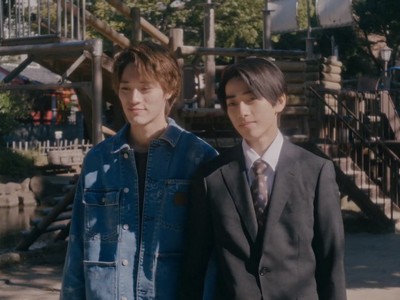
Jin uses a beautiful metaphor, comparing the unsent letters to small boats he sends into the sea. A similar analogy is how people put messages in a bottle. It allows them to express their feelings, even if the notes are never found. Jin's letters are the same. He pours his best wishes into them, almost like sending Haruki silent encouragement. Each letter reflects Jin's hope that Haruki will heal from his trauma. It's as if he's saying "I believe in you" without needing a response.
In the finale's closing scene, Jin and Haruki walk past the park where they used to meet as teenagers. Back then, this place carried painful memories. Every nighttime meeting was filled with Haruki's trauma and vulnerability. Now, they revisit it in the daylight, but their circumstances feel much brighter. The couple chats about getting married, going on vacation, and building a future. What began as a story about two lonely teens ends with them finding happiness together as adults. After enduring so much turmoil in their youth, the rest of their journey promises to be smooth sailing.
Special
Ending Review
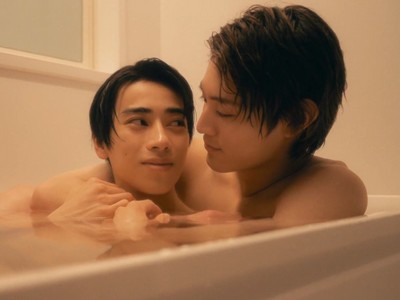
The special episode begins with an unexpected twist. "Let's get married… when the law changes." Jin suddenly adds an awkward condition to his heartfelt proposal from the finale. There's a clash between the romantic fantasy that we want to celebrate and the pragmatic reality faced by gay couples in Japan. I appreciate it whenever BL dramas connect their love stories to real-world societal issues, especially LGBTQ+ topics. These themes add a meaningful layer of depth to the narrative.
When it comes to his sexuality, Jin remains cautious. He's closeted to friends and family. However, his mom pressures him to settle down, while his straight peers are getting married. Knowing this secrecy weighs on him, Haruki suggests coming out. In the next scene, the couple has breakfast, where Haruki encourages his fiance to try honey on eggs. Jin hesitates but gives the unusual combo a try. This small moment reflects Jin's caution versus Haruki's boldness. Haruki pushes Jin to step outside his comfort zone, not just with food, but to take risks and reveal their relationship.
Caution
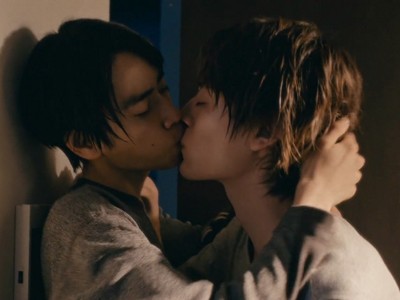
Due to his fiancé's influence, Jin has already become less cautious in life. He takes risks, like a spontaneous makeout session with Haruki in the car. "Is it OK to do it here?" Haruki pauses to ask. Jin admits no, but he continues kissing anyway lol. Later, Jin is anything but reserved during their steamy encounter. Previously, the couple's romantic exchanges were sweet and tender, but now? They sink their lips into each other, bang against walls, and knock over chairs. I didn't expect them to show so much passion. WHOA!
Unfortunately, Jin can't overcome his caution. During a meal with friends, Haruki creates an opportunity for them to come out, but Jin won't admit they have a relationship. Haruki respects his fiance's wishes and backtracks. Jin's fear of stigma is a burden he has carried all his life, but the real issue lies in societal attitudes. It's disheartening that Nemoto and Shiori can openly celebrate their relationship, yet Jin and Haruki are denied the same freedom. This episode includes a bathtub scene where water is confined to a small private space, similar to Jin and Haruki's love.
By the way, did you notice that Haruki is the only one not drinking alcohol during the meal? While everyone else toasts with shot glasses, he quietly sticks to tea. This small detail speaks volumes. Given his father's alcoholism, it’s understandable why he avoids drinking. Haruki also quit smoking, another habit he dropped from his youth. Haruki has cleaned up his lifestyle and made healthier changes, showing how far he has come.
Horizon
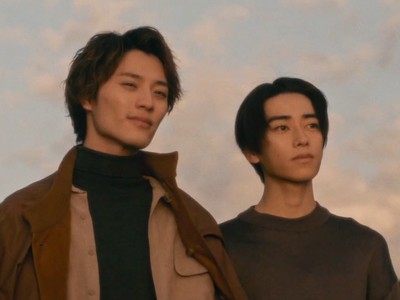
Jin is troubled by the injustices and his inability to change society. Noticing his frustration, Haruki suggests a trip to the sea. They arrive in the middle of the night, surrounded by darkness and unable to see the water. The scene reflects Jin's pessimism, but Haruki offers him a spark of hope. "Even if we can't get married, I'll always be by your side." Aww, isn't that sweet? In the next scene, a sunrise emerges in the horizon. The tides become visible, slowly reaching the shore. It's a hopeful sign for that change will come.
In the closing scene, Our Youth offers one final metaphor to capture Jin and Haruki's relationship. Jin places a jacket over Haruki, shielding him from the cold. He shows his nurturing instinct and protects Haruki in moments of vulnerability. Later, Haruki runs into the tides and invites his partner to join him, which Jin does. This moment symbolizes how Haruki encourages Jin to take risks. The series began with Jin following a predefined path, hesitant to step into uncertain waters. It ends as he casts his caution aside and plunges into the sea, embracing a world of possibility.
Our Youth Information
Links
- Gagaoolala Our Youth Gagaoolala
- Instagram Our Youth Instagram
- MyDramaList Our Youth MyDramaList
- Twitter Our Youth Twitter
- Website Our Youth website
- Wikipedia 未成年 Wikipedia
- YouTube Our Youth YouTube
Creator
Hi Noon (히눈) is a Korean artist whose webtoon was adapted into a Japanese BL drama. The series, Our Youth, was released in 2024.
Director
Keisuke Shibata (柴田啓佑) is a Japanese director. His first BL project is the 2023 drama, Mr. Sahara & Toki-kun. His other works include the 2024 series Although I Love You and You, which he co-directed with Yuya Takahashi (高橋雄弥). He also worked on the 2024 series Our Youth with Masaru Makino (牧野将), one of the directors for I Hear the Sunspot (2024).
Dear bl watcher, I am not surprised to read that we agree on something again. I've been waiting for many of your reviews (I hope you'll upload some that are long overdue) and although this was one of them, I didn't think you'd upload it so soon since this series just ended. I will wait for you to upload it in its entirety, but I have to agree with you that this one is a work of art.
I only watched episode 7 when I already knew it would be forever etched in my mind. What a beautiful and profound story and most of all: real. Again it makes us see that the bl has real possibilities to tell a story that resonates and not just stay in nonsense (which is sometimes necessary to entertain, I admit), but expand its range and go beyond to deliver us something with substance and quality.
I'm happy to say it's one of my favorite bl. And as always I'm a big fan of your work, thank you for your beautiful reviews. I hope you find the time to cover all the ones I hope to. Greetings.
Totally agree with your comments. Beautiful series. Wonderful acting. Gorgeous visuals.
Teaches us not to judge. Hirukawa was the irresponsible, bad, lazy guy in the eyes of society when in fact he was lonely and lost, protecting his mother from his violent father by taking all the blows himself. He had nothing to look forward to living until he met Jin – on the surface Jin's life was perfect: rich, top student, but in fact he was lonely and seeing a void future. Both of them lacked love, which they found in each other.
Hello, thank you for the amazing analysis. I totally love to read your perspective on dramas and I have come to start analyzing them a little myself while watching, which is more fun than expected. Especially when you connect the dots, its such a rewarding feeling (and you appreciate the drama ever so more).
A few things I might add, just because…:
• Water is literally in most key scenes!
– when they first actually „meet/see“ eacht other is at the sinks in school, where Haruki splashes („cleanses“) himself
– the playground they always meet at, has a little river to its side and the coolest thing of them all: the playground is shaped as a sailing boat!!!
– at school they always meet at the pool (example ep. 5)
– their first trip together is to the mother who lives by the sea
– in ep. 8 when Haruki leaves, instead of them both sitting in the “boat” at the playground together, they stand on opposite sides of the river bank, symbolising their distance and them braking apart
– in ep 10 they meet each other again at the river, but theyre on the same side again
– few random scences on bridges (for example ep. 10 when they give each other gifts)
• blue is a very prevalent colour (ice cream, lighting, clothes, ect)
• Minases fish tank always has only one fish, but after they reunite there are two fish in the tank! Aaah, so cute (im thinking of their “seas” that have finally truly mixed so they now share the same…)
• when Haruki says “it has melted” in ep 4 (the ice cream) it is also when Minase kisses Haruki back, it’s almost like hes saying Minases barrier has started to melt…
• lastly, I find the drama depicts depression quite well (the melancholic blue underlines this), self loathing stops oneself from truly being able to fully love someone else, because you never feel enough. This is why (an exception) I am not really “angry” about the time skip, Haruki needed distance and time to overcome his trauma.
All in all a beautiful series and thank you for your careful analysis, I’m always looking forward to your thoughts… ✨
I am glad you are back! We missed your reviews.
You have the best reviews out there! I always agree with your analysis of the shows, and therefore I always know that a show you recommend will be great.
I imagine it must take so much of your time and money to create and maintain this website, and I really appreciate it!!
Big fan of this review/analysis!!! 🙂
I looked up what kind of fish Minase keeps in the Drama and it's a "Blue Diamond discus". As a gem, a blue diamond symbolizes loyalty and trust and I've also read that "Opting for a blue diamond is a way of telling your partner that your relationship is as deep and vast as the ocean." This didn't seem like a widespread symbolization though. But it's still fun to speculate! The new, second fish is a "Symphysodon discus Marlboro Red" by the way!
I agree it's a great show and thanks again for yet another review that made me want to watch a show.
As someone who knows Japan well but Korea less so, there were a couple of things that jarred and made me wonder about the difficulties of turning what was originally a Korean story into a Japanese drama. Jin is studying hard — to go overseas to a US college? Nope; attending a prestigious US university is a ticket into the Korean power structure — not into the Japanese. You aspire to the kind of prestigious job that Jin clearly wants (and ends up getting)? You go to a top Japanese university. Also, if I"m not mistaken, Haruki's abusive alcoholic father is more of a Korean stereotype than a Japanese.
You point out that at the dinner where Jin and Haruki gather with their friends in the bonus episode that Haruki is the only one not drinking alcohol. Well, yes, but he's shown driving immediately afterwards and while the Japanese are tolerant –maybe too tolerant — of drinking, there is ZERO tolerance for drinking and driving. Even one drink can see you stripped of your license. Had Haruki been shown drinking, I doubt the show could even have been aired in Japan — they're that strict about it. (To be sure, the very fact that Haruki is the one entrusted with driving the two of them to the final scene is an apt, if oblique, acknowledgment of the role reversal the two of them have experienced in their relationship.)
To me, the most poignant moments in the whole series revolve around Jin's reluctance in the final episodes to "come out" publicly. SSM is probably coming to Japan within the next decade or so, but there is no way today — no way at all — that Jin can be open about his relationship with Haruki and expect to continue the career trajectory we're shown. Haruki, as a budding independent filmmaker, can get away with it; Jin can't — not yet, not in the kind of company where he is shown working. Our Youth is more realistic about these realities than, say, Cherry Magic: The Movie where the possibility of Kurodachi getting married is ambiguously presented. I would really like to see a second series that explores this: what happens when Jin's career aspirations clash with his love for Haruki.
(Really glad to see all the recent posts after a several month hiatus. Can't wait for your review of the great sleeper hit of 2024, the Thai BL Only Boo!)
One more point — the subtitles are sometimes not quite accurate. A case in point is the end of Episode 5 when the kiss breaks up, a moment you allude to. What Jin literally says is "gakko de yamero" which means "Let's stop this (kind of thing) at school". or "We shouldn't do this at school!" But the subtitle given is "Don't do it at school." It's a subtle difference but important. Haruki didn't force that kiss on Jin — Jin leaned down to kiss Haruki voluntarily. He is scolding himself as well as Haruki but the subtitle doesn't make that clear.
This- wow i love it, amazing show- it had everything- and was everything. I really appreciated the detail and the story telling, nothing felt rushed for me. Haruki is an example of physical and mental trauma coupled with neglect, Jin example of parental neglect. I really liked how these were portrayed, I liked Haruki’s mum but again i found her selfish. She found a way out for herself, and pretended not to see what her son was going through. This show has lots to unpack and i cant give it the poetic analysis that you have.
Thank you so much for watching all the BL drama/series even anime on our behalf and creating the great reviews that you do time and time again. You can tell that you are passionate about your craft as well as the professionalism to which you review all the content. I know we are to watch most of what is produced so Bl content keeps being made but i will admit that if you did not rate the movie a A,B,C or 100 to 79; i Sir will not watch it ..
Anyhow this was just to say thank you for this page and that i do read all of the content even if i may not watch it but i do read everything you write. Thank you so very much and please as much as you can please keep reviewing and keeping this page alive. From Tshegofatso who lives in South Africa
Thank you for your analysis.
Not a goldfish it's a beautiful white Discus my favourite tropical fish.
I wish you could tell me where to watch this series for free.
Like toranosuke (comment above) I would love to know where to find an online streaming version of this and other movies and TV series. It would also be nice to know not only the site where they can be streamed, but also the language, English subtitles availability, and cost.